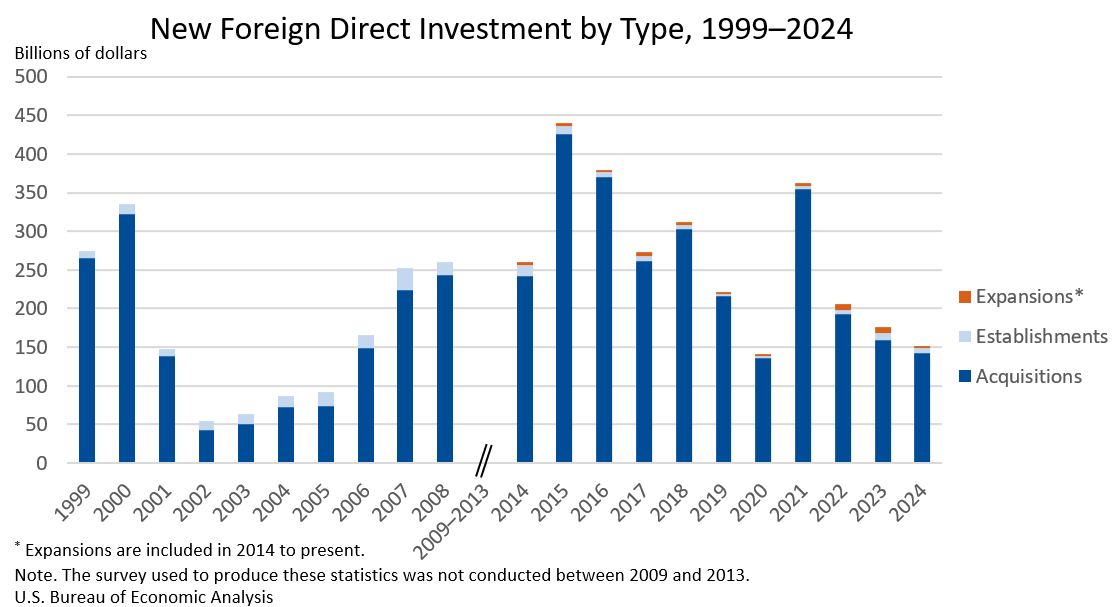Bureau of Economic Analysis
New Foreign Direct Investment in the United States, 2024
Expenditures by foreign direct investors to acquire, establish, or expand U.S. businesses totaled $151.0 billion in 2024, according to preliminary statistics released today by the U.S. Bureau of Economic Analysis. Expenditures decreased $24.9 billion, or 14.2 percent, from $176.0 billion (revised) in 2023 and were below the annual average of $277.2 billion for 2014–2023. As in previous years, acquisitions of existing U.S. businesses accounted for most of the expenditures.
Principal Federal Economic Indicators
Noteworthy
- 2025 News Release Schedule
- Innovation at BEA
- 2025 Annual Updates
- New! Services Trade Data for More Countries
- Data Tool: Trade in Value Added
- Distribution of State Personal Income
- Updated: RIMS II Regional Multipliers
- Arts and Culture
- Space Economy
- FDI Now in State BEARFACTS
- Quick Guide: Price Indexes
The Latest
U.S. International Trade in Goods and Services, June 2022
The U.S. monthly international trade deficit decreased in June 2022 according to the U.S. Bureau of Economic Analysis and the U.S. Census Bureau. The deficit decreased from $84.9 billion in May (revised) to $79.6 billion in June, as exports increased and imports decreased. The previously published May deficit was $85.5 billion. The goods deficit decreased $4.9 billion in June to $99.5 billion. The services surplus increased $0.3 billion in June…
Personal Income and Outlays, June 2022
Personal income increased $133.5 billion, or 0.6 percent at a monthly rate, while consumer spending increased $181.1 billion, or 1.1 percent, in June. The increase in personal income primarily reflected increases in compensation and proprietors’ income. The personal saving rate (that is, personal saving as a percentage of disposable personal income) was 5.1 percent in June, compared with 5.5 percent in May.
Personal Income and Outlays, June 2022
Personal income increased $133.5 billion, or 0.6 percent at a monthly rate, while consumer spending increased $181.1 billion, or 1.1 percent, in June. The increase in personal income primarily reflected increases in compensation and proprietors’ income. The personal saving rate (that is, personal saving as a percentage of disposable personal income) was 5.1 percent in June, compared with 5.5 percent in May.
Gross Domestic Product, Second Quarter 2022
Real gross domestic product (GDP) decreased at an annual rate of 0.9 percent in the second quarter of 2022, following a decrease of 1.6 percent in the first quarter. The smaller decrease in the second quarter primarily reflected an upturn in exports and a smaller decrease in federal government spending. For more details, including source data, refer to the Technical Note.
Gross Domestic Product, Second Quarter 2022 (Advance Estimate)
Real gross domestic product (GDP) decreased at an annual rate of 0.9 percent in the second quarter of 2022, following a decrease of 1.6 percent in the first quarter. The smaller decrease in the second quarter primarily reflected an upturn in exports and a smaller decrease in federal government spending.
Gross Domestic Product for Puerto Rico, 2020
Real gross domestic product (GDP) for Puerto Rico decreased 6.0 percent in 2020 after increasing 0.2 percent in 2019 (table 1.3), according to statistics released today by the U.S. Bureau of Economic Analysis (BEA). The decrease in real GDP in 2020 primarily reflected a decrease in exports of goods and services (table 1.4). Personal consumption expenditures, government spending, and private fixed investment also decreased. These decreases were…
Producto interior bruto para Puerto Rico, 2020
El producto interior bruto real (PIB) para Puerto Rico decreció 6.0 por ciento en 2020, luego de crecer 0.2 por ciento en 2019, de acuerdo con las estadísticas difundidas hoy por el Negociado de Análisis Económico de EE. UU. (BEA por sus siglas en inglés). La disminución del PIB real en 2020 reflejó principalmente un decrecimiento de las exportaciones de bienes y servicios. El gasto del consumidor, el gasto del gobierno, y la inversión privada…
Gross Domestic Product for Puerto Rico, 2020
Real gross domestic product for Puerto Rico decreased 6.0 percent in 2020 after increasing 0.2 percent in 2019, according to statistics released today by the U.S. Bureau of Economic Analysis.
The decrease in real GDP in 2020 primarily reflected a decrease in exports of goods and services. Personal consumption expenditures, government spending, and private fixed investment also decreased. These decreases were partly offset by an…
Producto interior bruto para Puerto Rico, 2020
El producto interior bruto real para Puerto Rico decreció 6.0 por ciento en 2020, luego de crecer 0.2 por ciento en 2019, de acuerdo con las estadísticas difundidas hoy por el Negociado de Análisis Económico de EE. UU.
Direct Investment by Country and Industry, 2021
The U.S. direct investment abroad position, or cumulative level of investment, increased $403.3 billion to $6.49 trillion at the end of 2021 from $6.09 trillion at the end of 2020, according to statistics released today by the U.S. Bureau of Economic Analysis (BEA). The increase reflected a $352.6 billion increase in the position in Europe, primarily in Ireland and the United Kingdom. By industry, holding company affiliates owned by U.S.…




